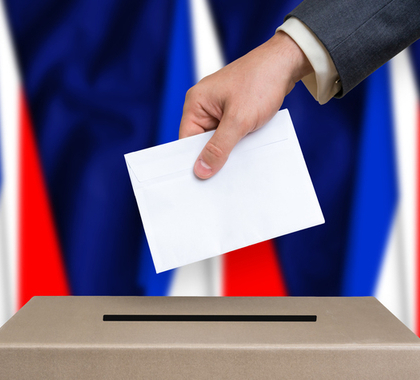On Sunday, April 23rd, the French will vote in the first of two rounds to determine their next President. In France, the system of elections involves, first, something of a jungle primary, in which many parties field candidates. This is followed by a run-off election, in which the top two vote-getters face off against each other. Opinion polls indicate that these will be two of the following four: (1) Emmanuel Macron, a social liberal running as an independent; (2) Marine Le Pen, the leader of the National Front; (3) François Fillon, candidate of the center-right Republicans; and, (4) Jean-Luc Mélenchon, a hard-left candidate.
Curiously, the candidate of the current President’s party, the Socialist Party, appears to have fallen behind the frontrunners.
France suffers many chronic problems including a stubborn budget deficit, middle class stagnation, and continuing high unemployment. Once fiercely independent and defining itself as a culture as opposed to a race, the country seems cowed by the cost of terrorism and a growing immigrant population that refuses to assimilate. Still, there is an amazing resilience to the country, including its economy, and reason to believe that – with appropriate reforms – it could enjoy a period of solid growth.
But, there is no agreement as to what the appropriate reforms would be. Is it rejection of the EU, the euro and NATO, for right-wing nationalist reasons? Or, it rejection of the EU, the euro and NATO for left-wing nationalist reasons? Is it tinkering around the edges and avoiding anything anybody deems offensive? And, will we be able to see the losers cry?
A couple years ago, this election looked to be in the bag for the candidate of Les Republicans (not “The” Republicans, “leh [soft h) Republi-CAN (do not pronounce the s).
But, something happened to turn this first round upside down. President François Hollande was actually too awful. He was so awful, one of the contenders for the nomination of the Socialist Party – Macron – reconsidered running as candidate of the party. Instead, he bolted the party and commenced running as an independent. With this move, he took the social liberal wing of the Socialist Party with him, and forced the centrist,
François Bayrou, out of the race.
A second thing that happened is that the candidate of the center-right Les RepubliCAN silent s got tripped up by a series of disclosures. He had a wife and some number of children – how many I don’t actually know – in government jobs, it was said. But, in France, isn’t everybody’s wife and children in a government job? But, monsieur, zis is not a jackhammer.
On such matters, elections are sometimes turned.




